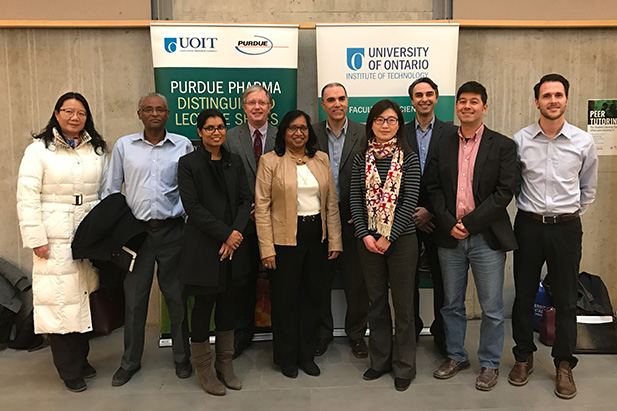Stanford University chemist presents at university’s Purdue Pharma Distinguished Lecture Series
March 31, 2017

The power of molecular design and chemical synthesis plays an enormous role in addressing problems in the fields of pharmacology and chemical biology. A leading organic chemist from the United States visited the University of Ontario Institute of Technology to share some of his research group’s findings at the Faculty of Science’s Purdue Pharma Distinguished Lecture on March 22.
Dr. Justin Du Bois of Stanford University in Palo Alto, California, explores how to turn toxins or poisons into tools for the study of protein behaviour. Dr. Du Bois’ research may help scientists uncover ways to develop new pain medications and potential applications for treating nerve injury.
In his lecture, Dr. Du Bois illustrated how molecular design and chemical synthesis of toxins and toxin derivatives, together with the tools of molecular biology and electrophysiology, can be used to investigate sodium ion channel structure and cellular function. These channels play a vital role in electrical signal activity in nerve cells.
- Link to 2017 Purdue Pharma Distinguish Lecture (runs approximately 60 minutes)
Quotes
“The thrill of new discovery is a huge part of what drives scientific passion. Purdue Pharma (Canada) is proud of its long-standing association with the University of Ontario Institute of Technology and this lecture series that attracts world-class researchers. We are excited about enhancing the sciences and helping meet the health-care needs of the patients we serve.”
-Arlene Ali, PhD, Executive Director, Medical Affairs, Purdue Pharma (Canada)
“The University of Ontario Institute of Technology is delighted to have Dr. Justin Du Bois be here on campus to share his expertise with our students, our faculty and the community. We also thank Purdue Pharma (Canada) for its commitment to the university, its support of this lecture series and its investment in the success of our students.”
-Greg Crawford, PhD, Dean, Faculty of Science
“Dr. Du Bois’ remarkable story is a testament to the value of curiosity-driven fundamental research. His early work on the development of novel chemical transformations allowed him to synthesize architecturally complex toxins and, more recently, to use them as pharmacological tools to investigate the structure and cellular function of sodium ion channels.”
-Yuri Bolshan, PhD, Assistant Professor, Faculty of Science and 2017 Purdue Pharma Canada Lecture organizer
About the Purdue Pharma Distinguished Lecture Series
Purdue Pharma (Canada) generously funds the Purdue Pharma Distinguished Lecture Series and has enthusiastically supported the University of Ontario Institute of Technology since the university’s inception. Working together, Purdue Pharma (Canada) and the university endeavour to encourage students to take an active interest in the sciences and provide them with opportunities to explore career and research options within the health science industry and beyond.
Established in 2008, the lecture series provides students with information about how current developments affect the health of Canadians while creating a forum for students and the community to connect with leading scientists. The series supports an annual bursary to a university Chemistry student specializing in Pharmaceutical Chemistry.
About Purdue Pharma (Canada)
Purdue Pharma (Canada) is a research-based pharmaceutical company with its headquarters, research and development (R&D) operations, and manufacturing located in Pickering, Ontario. The company, which employs more than 400 people across Canada, is a leader in the research, development and commercialization of medicines for the treatment of pain and central nervous system disorders (ADHD), as well as an over-the-counter portfolio.
Purdue Pharma (Canada) recognizes its responsibility to the community, including supporting the discovery of innovative medicines and quality education for the safe use of its products.



